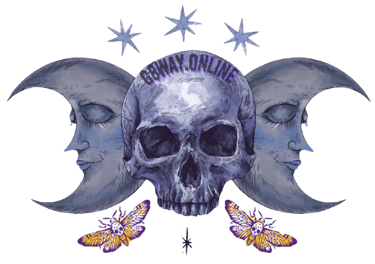Ok, occultism is a vast tree with a system of branches stretching thoughts and practices that deal with mystical, magical and the supernatural, presences that lie beyond the grasp of ordinary human perception. Rooted in the Latin occultus, meaning "hidden" or "secret," it encompasses a wide range of esoteric knowledge and practices—from alchemy, Kabbalah, and divination to witchcraft, science, sorcery, astrology, and ceremonial magic. Unlike mainstream religious systems, which are often publicly practiced and widely accepted, occultism thrives in the realm of the arcane, reserved for the initiated; those who simply want more and are willing to delve into the mysterious and often misunderstood aspects of existence. It explores hidden truths, metaphysical realities, spiritual transformation, and the unseen universe. In many communities—particularly those like the inner-city ghettos of Brooklyn—the word “occult” triggers fear and stigma, largely due to centuries of religious dogma that equates anything outside of orthodox Christianity with devil worship or evil. But to dismiss occultism as inherently "demonic" is intellectually lazy and historically inaccurate. This knee-jerk reaction is less about the occult itself and more about how conditioned society is to fear what it doesn’t understand—especially when it challenges the comfort zone of dominant religious narratives. Occultism is not about embracing darkness or rejecting God; it’s about seeking hidden knowledge, self-empowerment, and direct engagement with the mysteries of the universe that mainstream ideologies often overlook, suppress, or demonize. Hopefully, this explanation is satisfactory because, it don't get more simpler than that!


Urban Magic: Embracing Eclectic Witchcraft in the City
Let’s get one thing straight: not all of us can stroll barefoot through a mossy forest or moonbathe in a secluded meadow. Some of us are dodging traffic, subways, and sidewalk gum. So, when the spiritual advice says “connect to Earth energy by walking barefoot on the soil,” we city witches collectively sigh. That’s cute — but not always practical.
Still, that doesn’t mean we’re disconnected. For us urban dwellers, there are workarounds. Regular visits to a beach, a lakeside, a park with exposed soil, or even just a quiet moment near a tree in your neighborhood can help you plug into nature’s frequency. Nature is not always a grand forest — sometimes it’s a patch of sunlight on concrete, a bird nesting on a fire escape, or your own little plant altar by a window.
To truly come into your own as an eclectic witch — especially in the thick of city life — you’ve got to eat a big ol’ slice of humble pie, chase it with pride, and stay teachable. This path is not about ego or gatekeeping; it’s about being curious, consistent, and committed to growth. Make space for a routine. Show up for yourself. Again, and again.
So What Is Eclectic Witchcraft?
Simply put, Eclectic Witchcraft (also sometimes called Eclectic Wicca) is all about freedom and fusion. It’s a mix-and-match approach to spiritual practice that borrows from a wide variety of traditions, without locking you into any one of them. There really is no other explanation for it.
Here’s a breakdown:
🔮 Key Characteristics
Borrowing from Many Sources: Eclectic witches may pull from Traditional Witchcraft, Wicca, Shamanism, Hoodoo, or even Eastern philosophies. If it speaks to your soul, it’s worth exploring. Just walk cautiously.
Personalized Practice: This is your path, built your way. There’s no dogma here — just what works and feels right to *you*.
Flexibility: Mix tools, beliefs, and rituals until something clicks. Nothing is off-limits if your intention is clear.
Intention Over Rules: You’re not following a textbook — you’re writing your own. What matters most is what your practice means to you.
🌘 Eclectic Witchcraft vs. Wicca
Some eclectic witches identify as Wiccan, but not all do. Wicca is a defined religion with its own tenets and traditions, while eclectic witchcraft is more of a flexible spiritual path. Universal Eclectic Wicca, for example, is a more inclusive offshoot of Wicca that emphasizes broad exploration — but again, labels are yours to use (or not use) as you wish.
In the end, witchcraft is what you make it. There are no rules except the ones you decide to live by. So go ahead — build your altar on a fire escape, chant over your morning coffee, honor the moon through your apartment window. You’re just as valid as any witch in the woods.
Own your path. Walk it in boots, barefoot, or heels. Just walk it.
🌿 Examples of Eclectic Practices
Divination: Combine tarot, runes, pendulums, and even numerology; once you have a grounded and solid comprehension of what you're doing, then vibe with it. IF YOU DO NOT FULLY GRASP ritual proceedings, spells, etc., then ask someone. Revisit G8Way or use google - whichever way you go will ensure proper handling. There's just too much information available to be making stupid mistakes. Cross your T's and dot your I's and you should be fine.
Spellwork: Use herbs from your kitchen, crystals from your shelf, and candles from the dollar store. Magic is everywhere.
Rituals: Celebrate Sabbats, new moons, or even personal milestones — tailor them to suit your life and beliefs.
Spirit Work: Connect with ancestors, spirit guides, or energies that feel sacred to you — no matter the tradition they come from.
